You might be thinking, ‘Why should I bother with herbal medicine books when I can just search for information online?’ Well, while the Internet is a vast source of knowledge, it can also be overwhelming and unreliable. That’s where these 10 best herbal medicine books come in.
They have been carefully curated to provide you with accurate and comprehensive information on the subject.
Whether you’re a beginner looking to expand your knowledge or an experienced herbalist wanting to enhance your healing skills, these books offer a wealth of valuable insights and techniques.
So, if you’re ready to discover the top resources in the world of herbal medicine, keep reading to find out which books made the cut.
32 Home Treatments That Can Save Your Life one Day
Key Takeaways
- The Lost Book of Herbal Remedies and The Big Book of Herbal Medicine are recommended for their comprehensive information, colorful pictures, and practical tips on herbal medicine and natural remedies.
- Herbal Antivirals is highly regarded for its informative content on anti-viral herbs, but may be challenging to locate specific remedies for specific viruses.
- Rosemary Gladstar’s Medicinal Herbs is praised for its in-depth information on a variety of common and important herbs, as well as its clear presentation by an expert in the field.
- The Practical Herbal Medicine Handbook offers an extensive collection of herbal remedy recipes and comprehensive information on medicinal herbs, but may lack detailed information on dosage or studies.
The Herbal Medicine & Natural Remedies Encyclopedia
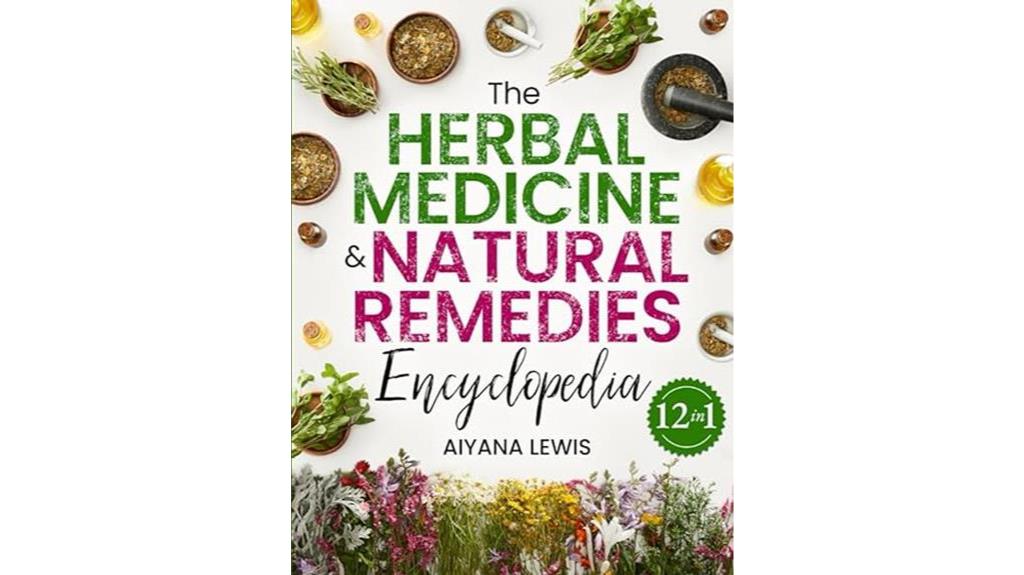
If you’re a beginner or someone interested in herbal and natural remedies, The Herbal Medicine & Natural Remedies Encyclopedia is the best choice for expanding your knowledge and healing skills. This comprehensive guide provides information about natural medicine using both well-known and lesser-known plants. Descriptions of plants and herbs include their medicinal properties, offering alternative solutions for ailments like migraines and joint flare-ups.
The encyclopedia encourages using herbal remedies instead of over-the-counter medicine, emphasizing the importance of understanding herbs. The ‘Story of Herbs’ chapter is particularly helpful for tea-drinkers, explaining the purpose of herbs in their drinks. It also explores various methods of using herbs, such as dried herb powder, infusions, jams, and pickles.
Additionally, the book encourages readers to make their own herbal products, empowering them to take control of their health. Overall, ‘The Herbal Medicine & Natural Remedies Encyclopedia’ is a valuable resource for anyone looking to delve into the world of herbal medicine.
Best For: Beginners or individuals interested in herbal and natural remedies.
Pros:
- Provides comprehensive information on natural medicine and healing herbs
- Offers alternative solutions for common ailments
- Encourages readers to make their own herbal products
Cons:
- Some readers find the book misleading with low-quality pictures
The Lost Book of Herbal Remedies
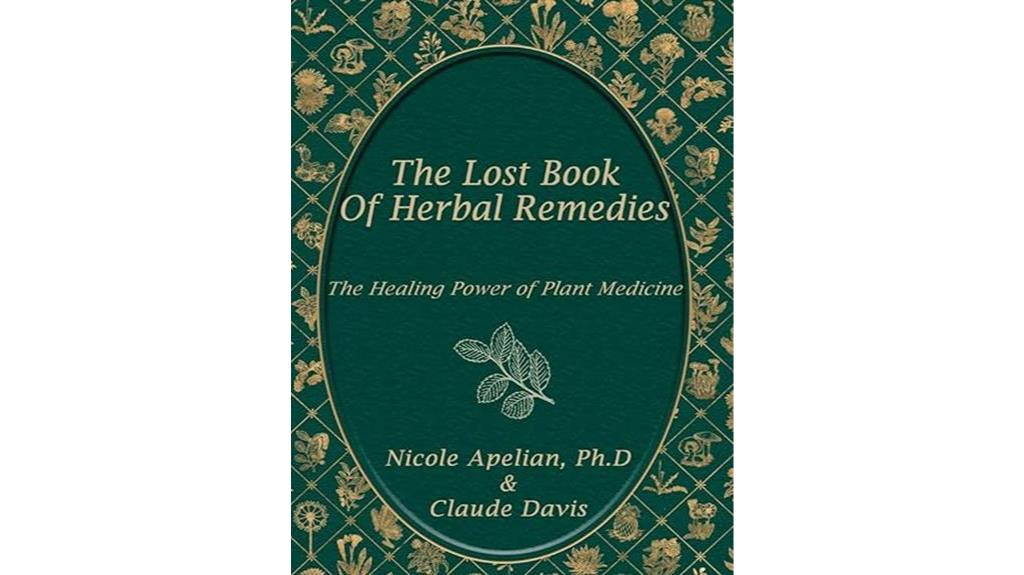
For those seeking a comprehensive guide to herbal medicine, The Lost Book of Herbal Remedies is a valuable resource filled with detailed information and vibrant plant images. This book has received positive reviews from readers who’ve found it to be informative, easy to read, and a great addition to their collection. The color pictures of the plants are particularly helpful in identifying and understanding their uses.
While some readers have expressed concerns about the lack of citations to support the information, overall, the book is highly recommended for those interested in herbal medicine. It’s considered a complete guide and includes a glossary that shows medical conditions and the corresponding pages for remedies. However, some readers have mentioned that the book is pricey and often out of stock.
Best For: Those interested in herbal medicine and looking for a comprehensive guide.
Pros:
- Informative and easy to read
- Color pictures of plants for easy identification
- Complete guide with glossary of medical conditions and corresponding remedies
Cons:
- Lack of citations to support information
Herbal Antivirals: Natural Remedies for Viral Infections (2nd Edition)
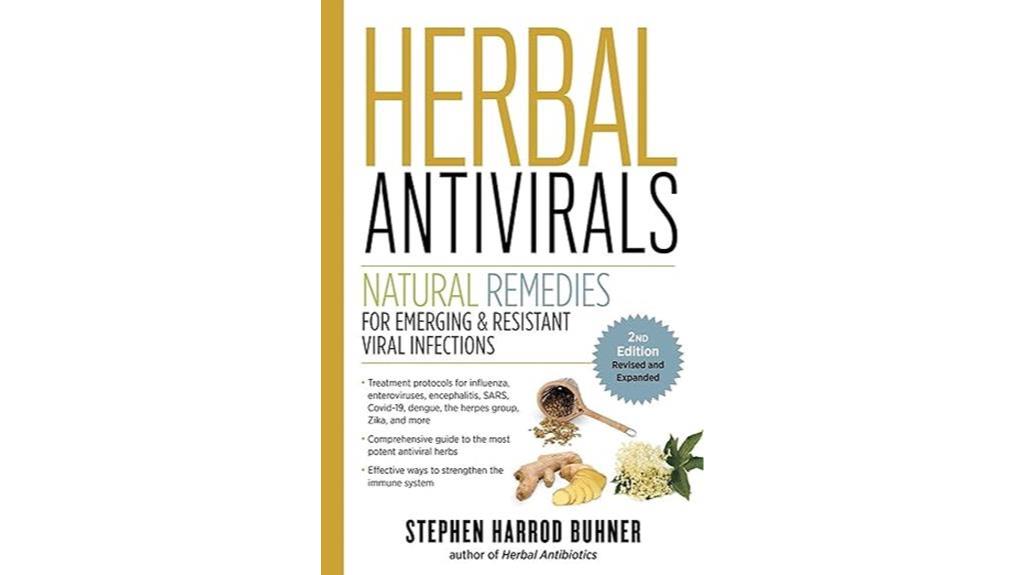
Discover the comprehensive knowledge and effective herbal remedies for viral infections in the second edition of Herbal Antivirals: Natural Remedies for Viral Infections, a must-have book for those seeking a reliable resource on natural healing.
This book has received positive reviews, with readers praising its informative content on anti-viral herbs. The author’s research is highly regarded and the book is considered a valuable addition to any at-home library.
Users have shared personal testimonials of successfully using the remedies mentioned in the book, such as andrographis and bentonite clay, to treat viral infections. However, some readers have criticized the book’s layout and organization, finding it difficult to locate specific remedies for specific viruses.
Additionally, there are complaints about the small font size and the use of ingredients that may be hard to find. Despite these drawbacks, the author’s knowledge and expertise in herbal medicine are highly praised, making this book a valuable resource for those interested in natural remedies for viral infections.
Best For: Individuals interested in natural remedies for viral infections and seeking comprehensive knowledge on anti-viral herbs.
Pros:
- Informative content on anti-viral herbs
- Highly regarded research by the author
- Valuable addition to at-home library
Cons:
- Difficult to locate specific remedies for specific viruses
The Big Book of Herbal Medicine: 300 Natural Remedies for Health and Wellness
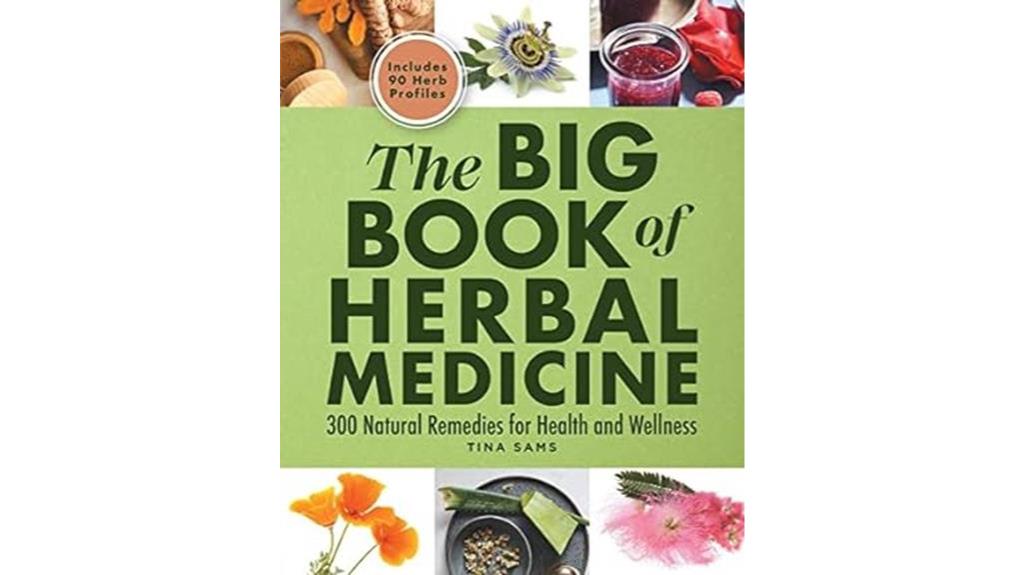
Avid alchemists and natural healers will find The Big Book of Herbal Medicine: 300 Natural Remedies for Health and Wellness to be an invaluable resource for their knowledge and healing skills. This book contains colorful pictures and vital information about plants, herbs, and roots, providing medicinal uses, safety considerations, preparations, and tips. It also includes recipes, measurements, and everything needed for herbal remedies.
The book has received positive reviews, with readers considering it a treasure and their new best friend due to its wealth of knowledge on herbs and awesome recipes. However, some critics have mentioned areas for improvement, such as the lack of description and pictures to identify plants, insufficient coverage of harvesting and preserving plants, and vague usage and application instructions in some recipes.
Despite these criticisms, the book is highly recommended for beginners and seasoned herbalists alike, as it provides guidance, enthusiasm, tested recipes, and safety guidelines in an easy-to-understand format.
Best For: Avid alchemists, natural healers, and individuals interested in herbal medicine and natural remedies.
Pros:
- Contains colorful pictures and vital information about plants, herbs, and roots
- Provides medicinal uses, safety considerations, preparations, and tips
- Includes recipes, measurements, and everything needed for herbal remedies
Cons:
- Lack of description and pictures to identify plants
Rosemary Gladstars Medicinal Herbs: A Beginners Guide (33 Healing Herbs)
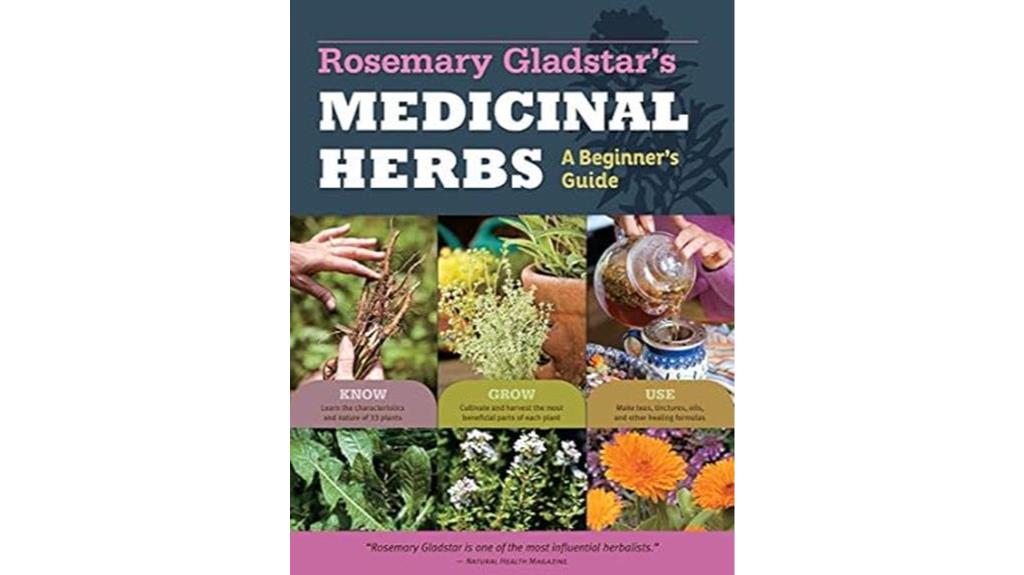
If you’re a beginner herbalist or someone interested in natural self-healing, Rosemary Gladstar’s Medicinal Herbs: A Beginners Guide (33 Healing Herbs) is the perfect choice for expanding your knowledge and developing your healing skills.
This book provides in-depth information on a variety of common and important herbs, teaching you how to plant, grow, and use them for various purposes. Written by Rosemary Gladstar, who’s extensive knowledge in herbalism, the book presents the information clearly and is recommended by multiple readers for its useful information and easy-to-follow instructions.
The book features a good heavy quality paperback with clear and colorful pictures. Each plant is introduced with growing and usage information, along with recipes. Readers appreciate the book’s usefulness and quality, and some have even bought multiple copies as gifts.
It’s highly recommended for those interested in herbal medicine and it instills a desire to learn more about herbal studies.
Best For: Beginner herbalists or individuals interested in natural self-healing.
Pros:
- Provides in-depth information on a variety of common and important herbs.
- Teaches how to plant, grow, and use herbs for various purposes.
- Written by Rosemary Gladstar, who’s extensive knowledge and presents it clearly.
Cons:
- Some herbs mentioned may not be native to Mexico or easily accessible.
The Practical Herbal Medicine Handbook: Quick Reference Guide to Healing Herbs & Remedies
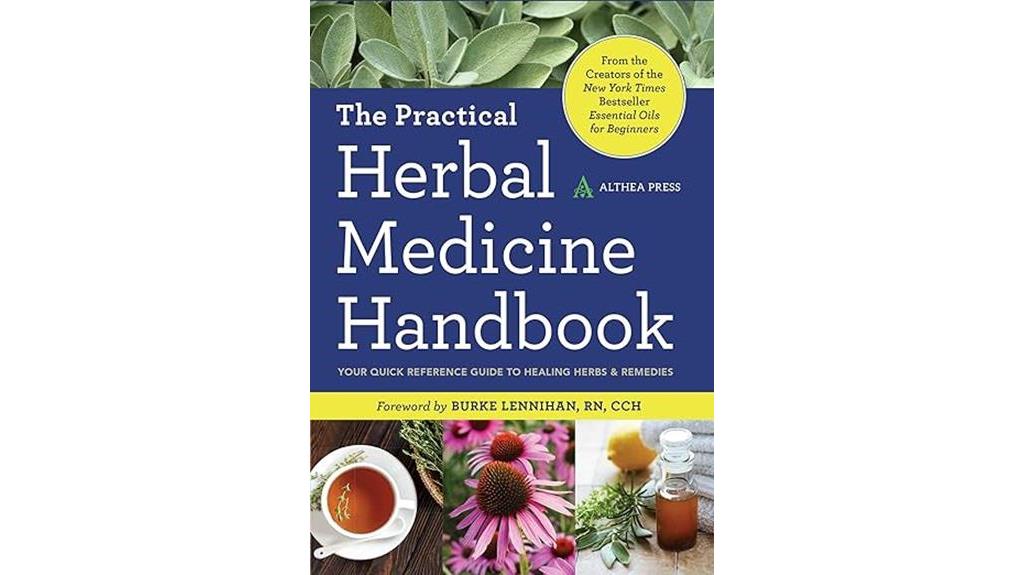
For those new to preparing herbal remedies, The Practical Herbal Medicine Handbook: Quick Reference Guide to Healing Herbs & Remedies is an excellent choice due to its extensive collection of herbal remedy recipes and comprehensive information on medicinal herbs. This book is huge and contains a large amount of herbal remedy recipes for common ailments and general wellness.
It also includes a section detailing the various uses for many medicinal herbs, providing a long list of healing herbs and what they can heal. Additionally, it teaches you how to make herbal remedies, making it a practical guide for beginners.
With its easy-to-read format and concise information, this book is recommended for those interested in learning about herbs and preparing their own remedies.
Best For: Those new to preparing herbal remedies.
Pros:
- Extensive collection of herbal remedy recipes
- Comprehensive information on medicinal herbs
- Teaches how to make herbal remedies
Cons:
- May not provide detailed information on dosage or studies
Herbal Medicine for Beginners: Healing Common Ailments with Medicinal Herbs
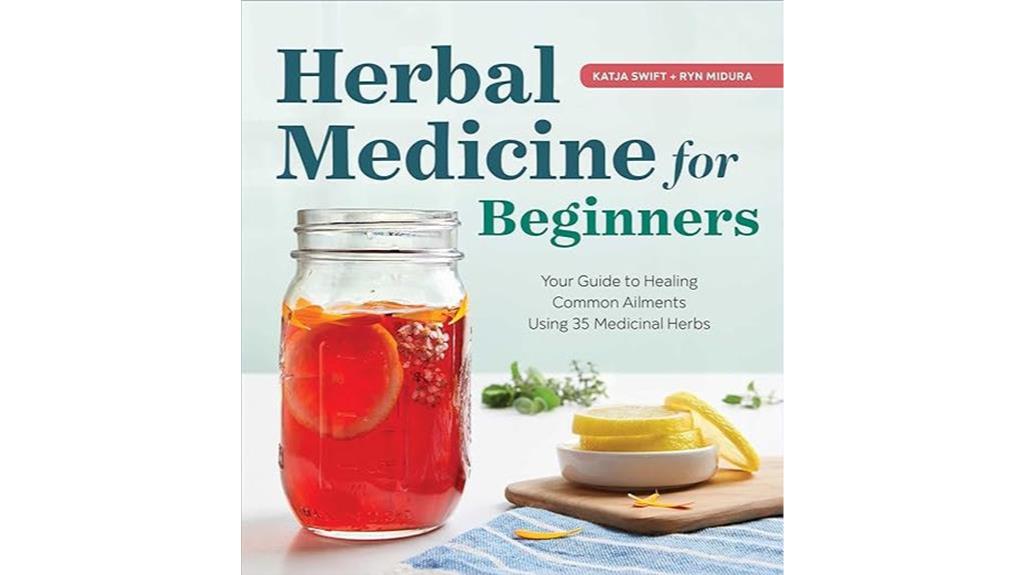
Discover how to craft herbal remedies and treat common ailments with easy-to-find herbs in Herbal Medicine for Beginners. Crafting natural treatments is straightforward with a handful of herbs that can be used to treat many conditions.
Get the information and the instructions you need with this easy-to-navigate guide, featuring basic healing plants, techniques to prepare and preserve them, and methods to apply them.
Pros:
- Great read, informative and important information
- Easy to use and navigate
- Offers a manageable number of accessible herbs
- Quality and finish of the book is nice
- Thorough and concise, not overwhelming
- Wide selection of herbs that cover various conditions and symptoms
- Shows versatility of each herb and how to combine them into powerful recipes
- Affordable price compared to other herb books
Cons:
- Does not take any step forward in terms of herbal remedies
- Recipes contain too many ingredients and require a large herbal apothecary
- Difficult to match herbal remedies to an individual’s energetics/body type/personality
- Recommended herbs are not common or easy to source as seeds
Despite these drawbacks, the book is praised for its thoroughness and versatility, as well as its affordable price.
Best For: Beginners interested in learning about herbal medicine and treating common ailments with medicinal herbs.
Master Recipes from the Herbal Apothecary: Whole-Body Health and Wellness Guide
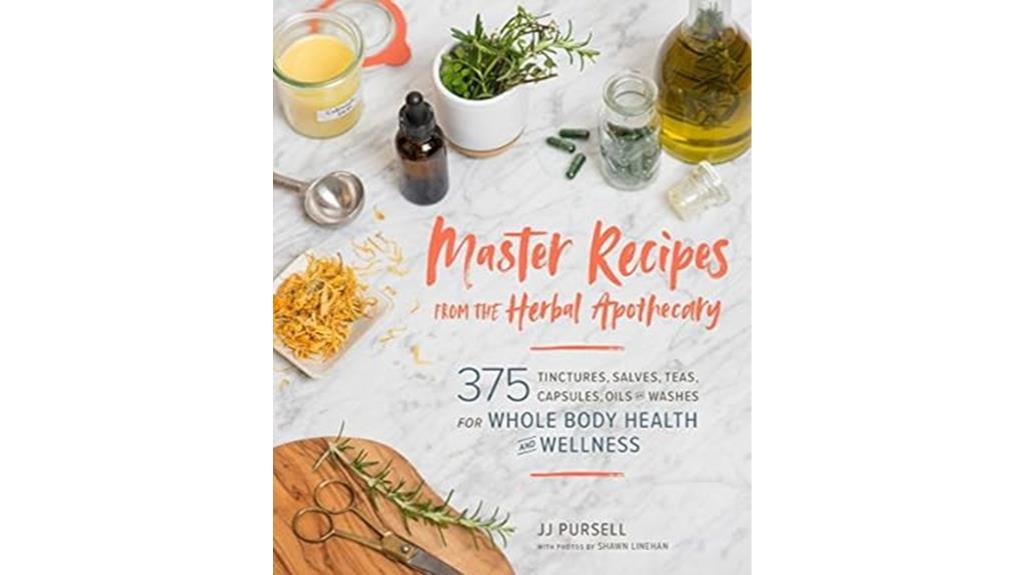
Discover the comprehensive guide to creating your own herbal remedies with Master Recipes from the Herbal Apothecary: Whole-Body Health and Wellness Guide. This book, with its positive reviews, has earned its place on many shelves and comes highly recommended by readers.
With clear and easy-to-follow instructions, it’s perfect for beginners and intermediates alike. The book contains a wealth of information, including profiles of frequently used medicinal herbs and beautiful photographs. It offers a wide range of ‘master recipes’ for different types of products, such as tinctures, salves, teas, capsules, oils, and washes, as well as specific recipes for addressing certain conditions.
The well-organized structure of the book makes it easy to find what you need, and the accessible recipes will help you create your own herbal products with confidence. Whether you’re a newbie or an experienced herbalist, this book is a great addition to any collection.
Best For: Those who are interested in creating their own herbal remedies and natural products, whether they’re beginners or intermediates in herbalism.
Pros:
- Clear and easy-to-follow instructions for creating herbal remedies.
- Profiles of frequently used medicinal herbs and beautiful photographs.
- Well-organized structure for easily finding specific recipes and information.
Cons:
- Some references to American plants may not be applicable to all readers.
Native American Herbalist’s Bible: 13 Books in 1 (Discover 500+ Herbal Remedies & Medicinal Plants)

If you’re interested in expanding your knowledge of herbal medicine and developing your healing skills, the Native American Herbalist’s Bible: 13 Books in 1 is an invaluable resource.
This comprehensive collection covers ancient traditions, beneficial properties, and the secrets left by Native Americans. It provides information on herbalism, its connection to spiritualism, and the top used herbs.
With an alphabetical list of herbs and plants, along with their uses and where to find them, you can easily retrieve the information you need. The book also includes alphabetical lists of ailments, making it even more convenient for you to find the remedies you’re looking for.
Additionally, you’ll learn how to store and use herbs effectively. Overall, this book is highly recommended for anyone interested in natural healing and self-care, as it serves as an encyclopedia of natural remedies and a guide to growing your own herbal garden.
Best For: Individuals interested in natural healing and self-care.
Pros:
- Informative content and easy readability.
- Extensive list of therapeutic plants and their uses.
- Tips on growing a garden and creating an apothecary table.
Cons:
- Lack of color pictures.
Herbal Medicine Natural Remedies Book
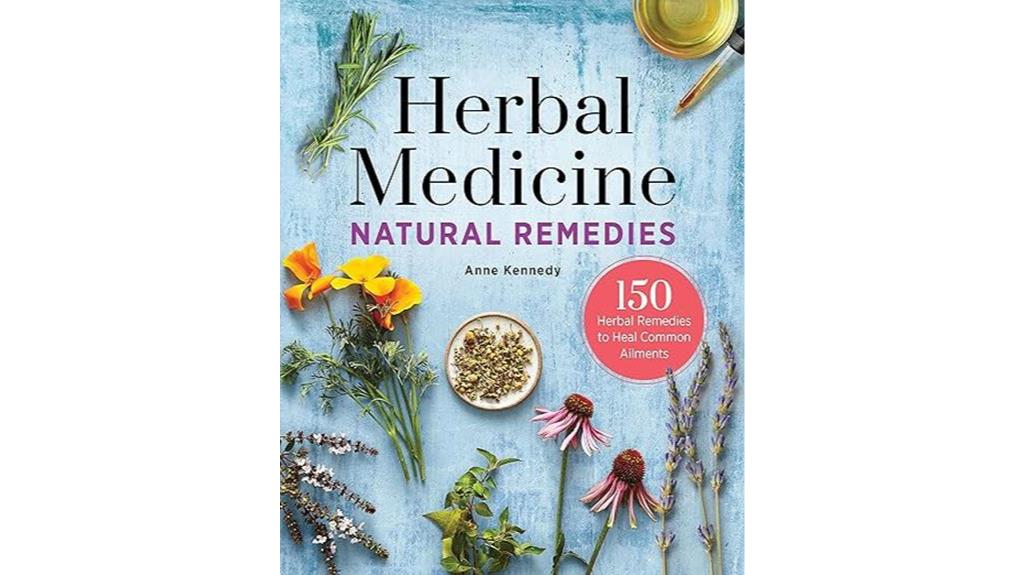
For those interested in herbal remedies and seeking an easy-to-understand guide, the Herbal Medicine Natural Remedies book is an excellent choice.
This book, written by Anne Kennedy, offers 150 natural recipes to heal common ailments. It’s specifically designed for beginners and those interested in herbal remedies, making it a handy reference for experimenting with herbal teas and creating a natural first aid kit.
The book’s layout is simple and easy to follow, with large, accessible font and captivating pictures of various herbs. Readers have praised the book for its easy-to-follow recipes, readily available ingredients, and educational value. Many have found it to be a cost-effective alternative to traditional healthcare, motivating them to change their lifestyle and gain basic knowledge in herbal medicine.
While it has limited coverage of herbs, the Herbal Medicine Natural Remedies book is still considered a go-to resource for its extensive collection of home remedies.
Best For: Beginners and those interested in herbal remedies.
Pros:
- Easy-to-follow recipes
- Readily available ingredients
- Educational value
Cons:
- Limited coverage of herbs
Factors to Consider When Choosing Herbal Medicine Books
When choosing herbal medicine books, there are several factors to consider.
- You should look at the author’s expertise to ensure they have the knowledge and experience necessary.
- Consider the organization of the content and if it’s easy to navigate.
- Visuals and illustrations can also be helpful in understanding the information.
- Consider the availability and price of the book, as well as its relevance to your specific ailments.
Author Expertise
Consider the author’s background and expertise in natural living, herbal medicine, and various remedies when choosing herbal medicine books. Look for authors with knowledge in areas such as herbalism, naturopathic medicine, tinctures, teas, aromatherapy, and essential oil remedies.
It’s important to choose authors who’ve extensive experience in using and studying medicinal herbs, as they can provide valuable insights and guidance based on their practical experience.
Additionally, consider authors with a strong reputation in the herbal medicine community, known for their passion, expertise, and dedication to promoting natural remedies. Authors with relevant qualifications, such as board-certified naturopathic physicians, herbalists, or experts in traditional herbal medicine, can also be a reliable choice.
Content Organization
When choosing herbal medicine books, it’s important to evaluate the content organization to ensure it meets your specific needs and preferences. Books offer a variety of ways to organize their content, including alphabetical listings of herbs, specific remedies for ailments, and in-depth information on herbal medicine. Some books also include chapters dedicated to herbal history, preparation methods, and the importance of understanding herbs before use.
It’s helpful to read reviews and feedback from other readers to see if the book’s content organization is well-received. Positive feedback often highlights the book’s clear and logical organization, helpful recipes, and detailed instructions for treating various ailments and injuries. On the other hand, some criticisms may include issues with the book’s layout, lack of visuals or detailed information, and potential errors in the content.
Therefore, carefully considering the content organization of herbal medicine books will ensure that you find one that suits your learning style and preferences.
Visuals and Illustrations
Visuals and illustrations in herbal medicine books vary, ranging from colorful pictures of plants to diagrams and photographs of herbal remedies. These visuals can greatly enhance your learning experience when delving into the world of herbal medicine.
Clear and colorful pictures of herbs make it easier for you to identify and understand their features, aiding in the identification of herbs and the comprehension of their medicinal properties. Whether you’re a beginner or an experienced herbalist, having detailed illustrations and visuals can be beneficial.
They provide a visual reference for herbal remedies and plants, making it easier to create your own herbal products and remedies.
Availability and Price
The availability and price of herbal medicine books can greatly impact the accessibility and affordability of valuable knowledge and healing skills. It’s important to consider these factors when choosing which books to invest in.
Some books may be pricey, while others offer good value for the content they provide. It’s worth noting that certain books may frequently be out of stock, which could affect their availability.
The price point of herbal medicine books can also influence the decision-making process for potential buyers. Different books offer varying levels of affordability, and some readers may find certain books to be too expensive.
It’s crucial to consider the availability and pricing of herbal medicine books as they can directly affect the accessibility of valuable information for those interested in exploring natural remedies.
Relevance to Specific Ailments
Considering the specific ailments you may be interested in addressing, it’s important to choose herbal medicine books that offer relevant remedies and guidance. These books provide specific remedies for common ailments, allowing you to understand the medicinal properties of herbs and address targeted health concerns.
By learning about specific herbs and their uses, you can find alternative solutions for specific ailments. Herbal medicine books offer guidance on how to use herbs to address particular health conditions, giving you the knowledge and tools to take control of your own healing journey.
Whether you’re looking to treat digestive issues, manage stress and anxiety, or boost your immune system, finding herbal medicine books that cater to your specific needs will help you on your path to wellness.
Use of Scientific Evidence
When choosing herbal medicine books, it’s crucial to consider the presence of scientific evidence and citations as a key factor. Look for books that provide detailed information on the medicinal properties of herbs and plants, supported by scientific research. This ensures that the information presented is reliable and based on evidence.
Additionally, consider the inclusion of safety considerations and warnings for herbal remedies, reflecting an evidence-based approach. By including this information, the book demonstrates a commitment to providing accurate and responsible guidance.
When evaluating the book’s content on herbal remedies, take note of personal experiences, testimonials, and expert opinions that consider scientific evidence. This helps to establish credibility and a well-rounded perspective.
Lastly, check for recommendations and endorsements from experts or reputable sources in the field of herbal medicine. These endorsements emphasize the importance of scientific evidence in the content and further validate the book’s reliability.
Clarity of Instructions
To ensure effective utilization of herbal remedies, it’s crucial to select herbal medicine books that provide clear and easy-to-follow instructions. When choosing a book, look for clear descriptions and pictures that aid in identifying herbs and their uses.
Beginners especially benefit from instructions that are easy to follow and understand. A well-organized layout and design can enhance the clarity of instructions in herbal medicine books.
Step-by-step guidance for preparing and using herbal remedies is essential, as it allows you to confidently and accurately utilize the healing properties of herbs.
Beginner-friendliness
If you’re new to herbal medicine, it’s important to choose beginner-friendly books that provide easily understandable information on herbal remedies and their uses. Some books offer clear instructions, easy navigation, and manageable herb selections suitable for newcomers to herbal medicine.
Positive reader reviews and recommendations specifically highlight the ease of use and accessibility for beginners. These books are recommended for those interested in natural remedies and a holistic approach to health, making them suitable for individuals new to herbal medicine.
Additionally, some books are praised for their layout, colorful design, and accessibility, which are beneficial for beginners seeking to learn about herbal medicine.
With these beginner-friendly books, you can confidently start your journey into the world of herbal medicine.
Conclusion
In the world of herbal medicine, knowledge is power. These 10 best herbal medicine books are like a treasure trove of healing secrets, unlocking the wisdom of ancient remedies and natural healing.
They’re like a garden of knowledge, where every page blooms with the potential to improve health and wellness.
So dive into these books and let your healing skills blossom like a field of vibrant herbs.
How to Survive a World Without Medication





